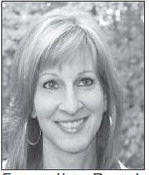Mr. and Mrs. Bluebird
Spring time is my idea of heaven. From the wild violets and dogwood blossoms bursting with life, to the sweet, earthy fragrance of green grass and fresh air, to the happy songs of hundreds of birds in the woods. Yesterday, I rocked on the porch and inhaled the day — a thin layer of pollen making my face feel somewhat gritty. That’s when I saw him — a sudden flash of indigo-violet blue. A male bluebird and his dull-incolor mate examined a small wooden house perched on a cedar post just on the edge of our front yard. A song from my childhood flowed into my mind.
Zip-a-dee-doo-dah, zip-a-dee-ay. My, oh, my, what a wonderful day. Plenty of sunshine headin’ my way. Zip-a-dee-doo-dah, zip-a-dee-ay! Mister Bluebird’s on my shoulder … I hummed the tune and watched Mr. and Mrs. Bluebird as they swooped in and out of the small hole in the box, filling it with grasses and other materials. In a few days, Mrs. Bluebird will deposit an egg or two or three in the nest they prepared yesterday. She won’t begin to incubate her eggs until she lays the very last egg — Mother Nature’s way of ensuring that all the eggs will hatch about the same time. The task of sitting on and warming the eggs will fall to Mrs. Bluebird, but Mr. Bluebird will probably provide much-needed moral support. Mr. Bluebird may give his wife a little respite here and there while she takes a break and leaves the box. Mr. and Mrs. Bluebird’s babies will hatch somewhere between 13 to 20 days after incubation begins, and then their lives will get even more interesting. Their babies will come into this world naked, blind, immobile and 100 percent helpless, like a human baby. From feeding them to protecting them to keeping them warm on cool evenings, Mr. and Mrs. Bluebird will have to do everything for the little fragile creatures. Every year, my husband and I enjoy watching the bluebirds care for their young, but truthfully, it wears us out. It’s nonstop. They don’t get to rest, and it is a beautiful example of parental dedication — again, much like their human counterparts. Mom and Dad fly in with all sorts of yummy insects for their offspring. From the porch, we can hear the babies wake up and peep, asking — screaming — for food. In my mind’s eye, I imagine them cocking their mouths wide open like PEZ dispensers. The parents feed each baby bird about every 20 minutes during daylight hours, and that’s a lot of work.
Their little eyes open at about eight days. Ten days after hatching, the babies develop pin feathers. They are usually ready to take that grand leap of faith when they are just 17 and 21 days old. Mom and Dad coax them out using the love language of birds — telling them that it will be okay, and that they can do it. Some can. Some can’t.
Those lift off days are even harder to watch. We often end up with three or four flightless fledglings hopping around in different parts of our yard. I worry that a sneaky snake or neighborhood cat will wander by and decide he or she wants a snack. The parents manage the situation continued from page
well and chirp directions to their babies. They are the motivational speakers of the bird kingdom.
By the next day, they are all gone, and I am relieved, but sad. I utter a silent prayer for these lovely, mesmerizing creatures.
I met a man a few months ago who folks refer to as, “The Bluebird Guy,” because he has helped hatch over 2,100 bluebirds in a 112-acre park just north of Atlanta. His real name is Jim Bearden. He monitors over two dozen bluebird boxes and fills up nearby feeding stations with dried mealworms. He reports the data to Nest-Watch (nestwatch.org), a nationwide monitoring program designed to track status and trends in the reproductive biology of birds.
“Researchers say we’ve lost nearly three billion birds in the last 50 years, so it’s important for us to do all we can to help protect and strengthen bird populations,” Bearden mentioned as we hiked together.
Even in my lifetime, I have noticed the dramatic drop in bird populations. They are disappearing in droves. Somehow, we have upset the delicate balance of nature, and that’s a problem.
As for me and my husband, we’ll continue to do our part. We feed our birds and provide a sanctuary for all species. We keep bluebird boxes as if we are booking Airbnbs for travelers.
We will continue to watch Mr. and Mrs. Bluebird build their nest and raise their young until they all fly away — it’s part of our springtime ritual. It’s a wonderful sound — the music of the birds in the trees. We have to do all we can to make sure future generations hear that sound, too.






out of
Posted on